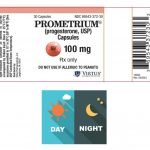Does Progesterone Make You Hornier?

What is progesterone?
Progesterone is a hormone that stimulates and regulates important functions, playing a role in maintaining pregnancy, preparing the body for conception and regulating the monthly menstrual cycle. Progesterone is one of the hormones in our bodies that stimulate and regulate various functions. Progesterone plays a role in maintaining pregnancy. The hormone is produced in the ovaries, the placenta (when a woman gets pregnant) and the adrenal glands. It helps prepare your body for conception and pregnancy and regulates the monthly menstrual cycle. It also plays a role in sexual desire.
During the reproductive years, the pituitary gland in the brain generates hormones (follicle-stimulating hormone [FSH] and luteinizing hormone [LH]) that cause a new egg to mature and be released from its ovarian follicle each month. As the follicle develops, it produces the sex hormones estrogen and progesterone, which thicken the lining of the uterus. Progesterone levels rise in the second half of the menstrual cycle, and following the release of the egg (ovulation), the ovarian tissue that replaces the follicle (the corpus luteum) continues to produce estrogen and progesterone.
What is Progesterone Therapy?
Progesterone therapy is a medical treatment that involves the use of synthetic or natural progesterone to supplement or replace the body’s natural production of the hormone. Progesterone is a female sex hormone that plays a crucial role in the menstrual cycle, preparing the uterus for pregnancy and supporting fetal development during pregnancy.
Progesterone therapy may be used to treat a variety of conditions, including:
1. Menstrual irregularities: Progesterone therapy can help regulate the menstrual cycle and treat conditions such as heavy bleeding or irregular periods.
2. Infertility: Progesterone therapy may be used to support fertility by preparing the uterus for the implantation of a fertilized egg.
3. Endometriosis: Progesterone therapy can help reduce the growth of endometrial tissue outside of the uterus and alleviate symptoms of endometriosis, such as pelvic pain and heavy bleeding.
4. Menopause: Progesterone therapy may be used as part of hormone replacement therapy to alleviate symptoms of menopause, such as hot flashes and vaginal dryness.
Progesterone therapy can be administered in several ways, including orally, through injections, or vaginally. The form and dosage of progesterone therapy may vary depending on the individual and the condition being treated.
Progesterone therapy may have potential side effects, including nausea, breast tenderness, and changes in mood or libido.
Does Progesterone Make You Hornier?
Researchers have repeatedly found that higher levels of estrogen have a positive effect on a woman’s sex drive. And that makes sense—after all, countless postmenopausal women can attest to the efficacy of estrogen therapy in restoring their sex drive. However, the impact of estrogen on sexual desire is not about estrogen alone.
Estrogen and progesterone levels rise and fall throughout the reproductive cycle. But they don’t rise and fall in unison. Rather, their proportions change to guide reproductive processes—the preparation of the uterine lining, ovulation, menstruation, etc. These changing proportions also have a significant effect on sex drive. As one study by researchers at the University of California, Santa Barbara notes, “With respect to within-cycle, day-to-day fluctuations in subjective desire, we found evidence for positive effects of estradiol and negative effects of progesterone.”
These findings are logical from a biological perspective, as estrogen is dominant and increases significantly prior to ovulation. Having a strong desire for sex at this point in the menstrual cycle greatly increases the chance of pregnancy. After ovulation, however, estrogen falls sharply. And while it does begin to rise again in the days following ovulation, so too does progesterone—and progesterone levels begin to exceed estrogen. During this phase of the cycle, many women find that their sex drive diminishes. After all, there is no reproductive advantage to sex during this part of the menstrual cycle. And while humans are not entirely beholden to biology and our relationships with sex and desire are infinitely complex, biology can and does continue to play a vital role in our lives.
Without adequate estrogen, your body may not be receiving the signals it needs to desire sex. For women who are struggling with low sex drive, it is therefore worth examining whether the relationship between estrogen and progesterone has become unbalanced.
Progesterone levels in males are similar to those of females in the follicular phase of the menstrual cycle, when the egg follicle on an ovary is preparing to release an egg.
Symptoms of low progesterone in males include:
• Low libido
• Hair loss
• Weight gain
• Fatigue
• Depression
• Gynecomastia, which is breast development in males
• Erectile dysfunction
• Impotence
• Bone loss
• Muscle loss
Men with low progesterone levels have a higher risk of developing:
• Osteoporosis
• Arthritis
• Prostate cancer
• Prostatism, an obstruction of the bladder neck, typically associated with an enlarged prostate gland
As males age, testosterone begins to decline, estrogen levels rise, and progesterone levels fall dramatically.
What to Do If Progesterone Therapy Is Making You Hornier
If you are undergoing progesterone therapy and are experiencing an increase in sexual desire or hypersexuality, it is important to speak with your healthcare provider. They may suggest adjusting your dosage or switching to a different form of progesterone therapy that may be better suited for your needs.
Progesterone therapy is often used to treat conditions such as irregular menstrual cycles, endometriosis, and infertility. While increased sexual desire or hypersexuality is not a common side effect of progesterone therapy, it may occur in some individuals.
In addition to speaking with your healthcare provider, there are other steps you can take to manage hypersexuality or increased sexual desire, including:
1. Engaging in regular exercise or physical activity, can help reduce anxiety and promote overall well-being.
2. Practicing mindfulness or meditation, which can help you better understand and manage your thoughts and emotions.
3. Engaging in psychotherapy or counseling, which can help you explore the underlying causes of hypersexuality or increased sexual desire and develop coping strategies.
4. Seeking support from friends, family, or a support group, which can provide a safe space to discuss your experiences and receive guidance and support.
Overall, it is important to be open and honest with your healthcare provider about any side effects you may be experiencing while undergoing progesterone therapy or any other form of treatment. They can work with you to find the best course of treatment for your individual needs and help you manage any symptoms or side effects that may arise.





